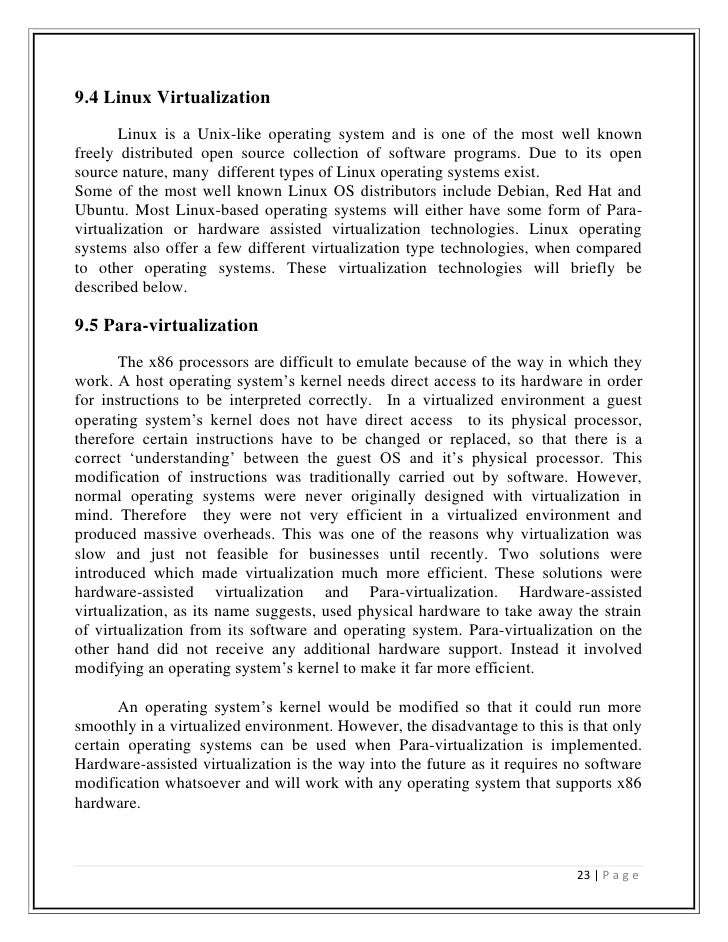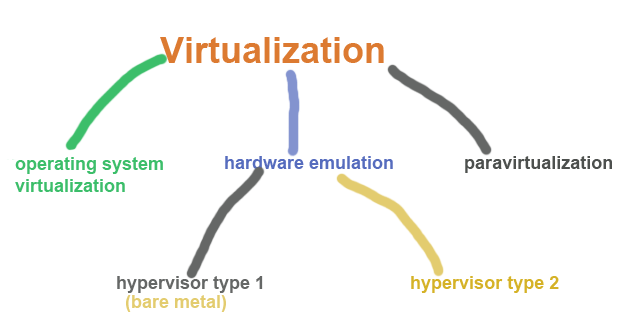Virtualization Advantages And Disadvantages Pdf
Over the past few years, virtualization has been the focus of data center and enterprise technology, where a huge number of businesses are already implementing it using cloud computing and other solutions. Even small enterprises, especially those that rely on data processing, are enjoying the benefits they get from virtualization. However, it is important to note that this technology is not all good, and there are some specific challenges that it poses to businesses. This means that you should understand exactly its pros and cons to be able to decide whether it is applicable to your organization. List of Pros of Virtualization1. It can lower overall capital expenditures.With virtualization, you will no longer need to purchase a server for each of the applications you are going to implement in your organization.
- Advantages Of Virtualization In Cloud Computing
- Data Virtualization Disadvantages
- Virtualization Advantages And Disadvantages Pdf File
You will be able to host multiple virtual servers on a single physical machine, which means that you will have lower overall capital expenditures.2. It can reduce IT costs.This is one of the biggest advantages associated with using this technology in your IT infrastructure, where you do not have to invest in equipment that are incredibly expensive and in-house IT professionals to be able to easily access various software and servers. Also, virtualization is contrived to be affordable, as you do not have to purchase hardware outright, which means more savings. You simply pay a third party, who own and maintain all servers, for their virtualization services without having to spend additional costs.3. It automates routine tasks.This technology allows you to automate your important routine IT tasks. Something that is as simple as patches for your operating system will become simpler and quicker.4.
It makes a business energy-efficient.Virtualization is seen as revolutionary advancement due to a number of reasons, and one of those having the most impact is energy savings. By implementing such a technology in your business, you will be able to lessen your carbon footprint immensely, which would eventually make a big difference overall. If your organization is environmentally conscious, then virtualization is the way to go.5. It promotes greater redundancy.Virtualization technologies can help you improve your uptime by allowing greater security and safety while reducing points of contact.6. It greatly helps with development.This technology is observed to be very helpful in development environments.
For example, if you are running several websites, you can make the coding process of these sites easier by using a virtualized server.7. It allows for faster deployment.In a virtualized environment, provisioning would become quick and simple. You should know that deploying virtual machines is simpler than deploying the older physical versions.List of Cons of Virtualization1. It requires high upfront expenditures.Though it was stated that virtualization is cost-effective, when you implement such a strategy from the ground up, it would mean that are you are going to have to invest more money in hardware in the near future. Nevertheless, you will definitely save in the long run, but take note that implementation can get costly.2.

It comes with limitations.One major disadvantage of using virtualization is that it involves various limitations. Take note that not all servers and applications are virtualization-friendly, which means that some aspects of the IT infrastructure of your business might not be compatible with virtualized solutions.

Advantages Of Virtualization In Cloud Computing
You should consider the fact that there are still vendors that do not fully support virtualized environments.3. It puts data at risk.Since data is crucial to your business, it is of utmost importance that you only choose virtualization solutions that offer adequate data protection. Remember that not having your own server can put your data at risk, making it vulnerable.4. It comes with the danger of server sprawl.While virtualization is very easy to deploy, there is always the risk that new servers would be added even if they are not necessary. For instance, instead of having 10 virtual servers that you really need, you might have 20 or more.5. It comes with issues of availability and scalability.Most of the time, the terms availability and scalability are intertwined when it comes to networking, as both are relevant to server virtualization after all. Availability would become a problem if virtualized servers go offline and every website they host would also fail.
Data Virtualization Disadvantages
Scalability is even trickier, considering that virtualization offers a means for several small businesses to share the costs associated with hosting. As you can see, while a business may start out small, there is always the possibility that it could grow big and easily dominate a virtualized server, robbing resources from other websites.6. It has security flaws.The process of virtualization is designed to separate virtualized resources, but there are still cases where servers were accidentally visible to other people who were not supposed to see them.7. It comes with the risk of bleed-overs.Bleed-overs are possible issues to be aware of when subscribing to a virtualized server, occurring when the contents of a certain server affect other servers. For instance, a chat room that occasionally hosts live discussions with IT industry professionals would experience its chat members receiving a pop-up window stating that they already exceeded the total bandwidth allocation and being booted out of the chat room.

Virtualization Advantages And Disadvantages Pdf File
What’s worse, this can still happen even if your internet service provider (ISP) was not limiting bandwidth consumption. The thing is, there might be another site that is hosted on the same server implementing a shareware bandwidth limitation program, which can limit bandwidth for the server as a whole.Many businesses and organizations of today are already taking advantage of virtualization because most of their operations are highly dependent on IT processes. This is regarded as a wise investment that makes management of data more efficient and convenient. However, for your organization, you must make sure that you are aware of both the advantages and advantages of using virtualization to ensure that you will be able to implement and manage it properly.